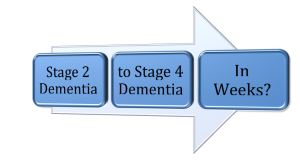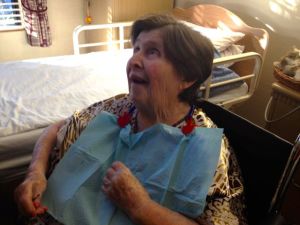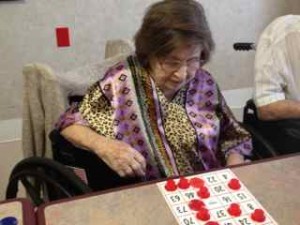
by Diane Masson | Jan 10, 2016
 Do you know a senior(s) who has mild to moderate Alzheimer’s? This article will share what a clinical trial is testing and how far along in the Alzheimer’s disease a senior can be to remain eligible to participate. There are about 60 study sites located around metropolitan areas in the United States.
Do you know a senior(s) who has mild to moderate Alzheimer’s? This article will share what a clinical trial is testing and how far along in the Alzheimer’s disease a senior can be to remain eligible to participate. There are about 60 study sites located around metropolitan areas in the United States.
Nourish Ad clinical research study is testing an investigational treatment for Alzheimer’s disease and memory loss. “Investigational” means that this treatment is currently being tested and isn’t approved or available for use by the public. The investigational drug is called AC-1204. It is a double-blind study to improve thinking processes for people with Alzheimer’s disease. If a senior volunteers for this study, they either get the drug AC-1204 or not. Learn more about the company, the drug and eligibility for the trial HERE.
My mother-in-law, Amy, has Alzheimer’s and I hope we can figure out this disease in her lifetime.
I am not a doctor, but my simplified version of this trial is as follows: Seniors’ brains work on glucose. Seniors with Alzheimer’s brains do not process glucose normally. This trial will give a senior with Alzheimer’s a daily drink that provides an alternative energy source for the brain to improve memory.
A total of 480 seniors can qualify for this 6-month study. Senior participants must be 66 to 90 years old with mild to moderate Alzheimer’s or memory loss. The senior must have a permanent caregiver or family member participate in the study as well.
The study is designed to look at the safety and effectiveness of AC-1204. If a senior completes the first part of the study, he or she will have the option to continue AC-1204 for 6 more months at no additional cost.
There may be risks for participating in any clinical trial. Consider the risks and benefits before involving your loved one. Clinical studies are required by the FDA (Food and Drug Administration) prior to the release of a drug to the general public. Not all investigational drugs are approved by the FDA.
Learn more about the NOURISH AD study at ClinicalTrials.gov
For managers/administrators of assisted living and memory care communities: If your community resides by one of the metropolitan study sites, a local doctor who is overseeing the research study could put on a presentation for your staff/caregivers or possible participants. Call Laura for more information at: 303.999.3742.
Diane Masson is a senior living expert who has authored two 5-star rated books. “Your Senior Housing Options,” empowers seniors to plan ahead and make their own decisions for the future, instead of waiting for a health care crisis and having family members put them someplace. The second book was written for senior living professionals called, “Senior Housing Marketing – How To Increase Your Occupancy and Stay Full.” Reach out to her through her website: Tips2Seniors.com and read the weekly blog.

by Diane Masson | Jul 5, 2015
 Professionals have told me that a trauma could have caused Amy’s dementia (my favorite mother-in-law) to escalate rapidly. Is this true? Can all the dementia professionals and family members weigh in with their experiences?
Professionals have told me that a trauma could have caused Amy’s dementia (my favorite mother-in-law) to escalate rapidly. Is this true? Can all the dementia professionals and family members weigh in with their experiences?
My mother-in-law’s dementia was progressing slowly like my mom’s vascular dementia. There are four stages of memory loss and Amy was in stage 2, before the trauma. She repeated herself a lot, needed cueing for personal hygiene, medication management and had little desire to leave the home. Amy talked about not being able to remember stuff, but she could still read the paper, dress, bathe, toilet and feed herself.
Then Bill, my favorite father-in-law and Amy’s 24-7 caretaker, had a heart attack and went to the hospital. Amy could not understand where her rock and husband of 65 years had gone. She ended up having a psychotic break and eloping (The police had to find her and bring her back home.). A whole series of dramas happened and she hit a nurse. Then she too was hospitalized and put on psychotropic medications. Amy was in the hospital for three weeks in the psych ward.
By the time she got out of the hospital, the Amy I had seen months earlier was gone. The first time my husband and I saw her after the hospitalization (we live three states away) was so sad. The vivacious and sarcastic Amy was gone. It was like seeing a shell of her former self. Her lip trembled, her arm shook and she was so sleepy from the Haldol drugs. We immediately got the psychotropic medication reduced by half. It took us another three months to get her completely off the Haldol because we are not Amy’s Power of Attorney.
Amy was suddenly in stage 4 dementia. She needs help with absolutely everything and is not able to communicate her thoughts or needs. Hospice has been discussed in care plan meetings.
Has anyone else seen such a rapid decline with a family member or resident with dementia? Was it losing her husband, the psychotropic medications or both that caused Amy’s rapid deterioration? I believe that if my in-laws had planned ahead and moved into a Continuing Care Retirement Community (CCRC) that staff and residents would have supported Amy when her husband was first hospitalized. The CCRC would have rallied around her, helped her transition to the care level she needed and her world wouldn’t have changed so dramatically (she would have been dining daily with resident friends instead of being isolated in her own home).
What do you think?
“Your Senior Housing Options,” has a simplistic title, but what’s inside this new book can save a you months of research time. Hear Diane Masson’s interview of how her mother and in-law’s faced the pivotal decision to plan ahead or wait until a crisis. Learn the pitfalls from transitioning from your home to senior housing. Understand what questions to ask, insider tips and dirty secrets revealed. The decision to stay home requires caregivers. Prevent elder abuse by determining if a home care agency is reputable, before they move into your home. You are just not looking for today’s needs, but for your future care. Discover key differences between rental facilities vs Continuing Care Retirement Communities. Do you have enough financial resources if you need to be in a higher level of care for an extended period of time? For weekly tips join at: Www.Tips2Seniors.com
Diane Masson has worked in senior housing for 17 years and is the regional marketing director for two debt-free Continuing Care Retirement Communities in Southern CA (Freedom Village in Lake Forest and The Village in Hemet). Her first book “Senior Housing Marketing – How to Increase Your Occupancy and Stay Full,” is being utilized by senior housing professionals across the country. Both her first book and second book, “Your Senior Housing Options,” have a 5-star rating on Amazon.com.

by Diane Masson | Nov 2, 2014
 Am I a bad daughter? Yesterday, I learned the shocking truth that my mom has five missing teeth. My mom has lived in a higher level of care for over eight years. Seven years in assisted living in Seattle and the last 17 months in skilled nursing care in California.
Am I a bad daughter? Yesterday, I learned the shocking truth that my mom has five missing teeth. My mom has lived in a higher level of care for over eight years. Seven years in assisted living in Seattle and the last 17 months in skilled nursing care in California.
My mother has had vascular dementia for over 10 years and I have been attending doctor appointments with her for years. Why did I never consider oral health and attending a dentist appointment?
It was pure luck that I visited my mom this week when the mobile dentist was there. Dr. Mark Mroch was awesome. He had a funny and engaging personality. My mom was completely enamored with him. They were joking back and I forth and I was cracking up.
According to dental records the five teeth were missing when my mom arrived in California. Now that I have processed this situation, I have some unanswered dental questions:
- Why did no one tell the POA (Power of Attorney) of a dementia patient that her mom had five teeth missing when it was first discovered?
- Has my mom with her dementia been responsible for her own dental hygiene for all these years?
- Do assisted living and skilled nursing communities brush and floss teeth?
- How often?
- If the senior tells the caregiver that flossing hurts, do they just discontinue flossing and not tell the family?
- Is a dentist required to request flossing in order for it to happen?
Can you please share what the oral hygiene policy is at your assisted living, skilled nursing or memory care community? I know the goal is to have the residents be as independent as possible and brush his or her own teeth. What if they are not doing a good job? When does staff step in to help? Do staff actually watch them brush their teeth or is this one of those back burner items that can get overlooked?
My mom lived in a social model of assisted living. She was borderline skilled nursing for a year or so before we moved her. Is the dental program for dementia different in a social vs. medical model of assisted living?
Please help me figure this out and maybe we can help some POA’s out there who never thought about oral hygiene before. It’s vital that we advocate for our loved one.
Thanks, Diane
Diane Twohy Masson writes this weekly blog to support and engage with other senior housing professionals. Her first book is Senior Housing Marketing – How To Increase Your Occupancy and Stay Full. Many sales teams and organizations have used the 12 keys contained in this book for their weekly book review.
Diane Masson has recently created a New Guide for the Silver Tsunami. Her second book offers a pro-active approach for a senior to navigate his or her way through the senior housing market. “Selecting Senior Housing Options for Seniors IN the Silver Tsunami” is coming soon to Amazon.com. www.tips2seniors.com
© Marketing 2 Seniors| Diane Twohy Masson 2014 All Rights Reserved. No part of this blog post may be reproduced, copied, modified or adapted, without the prior written consent of the author, unless otherwise indicated for stand-alone materials. You may share this website and or it’s content by any of the following means: 1. Using any of the share icons at the bottom of each page. 2. Providing a back-link or the URL of the content you wish to disseminate. 3. You may quote extracts from the website with attribution to Diane Masson CASP and link https://www.marketing2seniors.net For any other mode of sharing, please contact the author Diane Masson.

by Diane Masson | Sep 1, 2013
 I can’t stop thinking about my surprise visit with my mom yesterday. I arrived Sunday afternoon about 2:30 PM to Freedom Village Healthcare Center in California. She was not in her usual places – where was she? A caregiver said, “Oh, your mom is down in the activity room.” I said to my husband Chris, “We really need to pay more attention to the activity calendar, so we don’t visit during those times. I want her to enjoy all the social times and I can visit her when nothing else is going on.”
I can’t stop thinking about my surprise visit with my mom yesterday. I arrived Sunday afternoon about 2:30 PM to Freedom Village Healthcare Center in California. She was not in her usual places – where was she? A caregiver said, “Oh, your mom is down in the activity room.” I said to my husband Chris, “We really need to pay more attention to the activity calendar, so we don’t visit during those times. I want her to enjoy all the social times and I can visit her when nothing else is going on.”
We happened upon the activity calendar and all the activities were done for the day. So what was she doing? As we turned the corner, we saw my mom’s beaming face. She was playing bingo. The caregiver smiled at me and said, “Oh, do you want to take your mom?” I said, “Absolutely not, let her enjoy herself.” It was great to see pure joy – when she said, “Bingo!”
What was interesting to me was her interacting with the other residents and helping them play too. My mom has severe vascular dementia. When she speaks it is about 70% non-reality. What a great activity to really stimulate her brain. The caregiver said to me, “We decided to put on a bingo game for them, they like it and it gives them something to do.”
Well, bless those two caregivers who created an unscheduled resident activity to help with the resident’s quality of life. This was a huge “Wow” for me and I can’t stop thinking about how happy my mom was. For those of you who follow my blog, I moved my mom 1000 miles to be near me about three months ago. This was the best day of my mom’s life here in California.
After each resident said bingo, the caregiver would call the resident by name and say, “You won a cookie.” No cookies appeared. I thought to myself, well the residents have dementia – they won’t remember the cookie promise. To my utter surprise – cookies appeared at the end of the last game. One cookie for each resident. When the caregiver was handing out the last cookie, the resident said, “I don’t get one – I didn’t win.” The caregiver said, “That’s okay, you are a winner for even being here.” There are tears in my eyes writing this, because these staff went above and beyond!
As the afternoon progressed – my mom continued being animated and talking nonstop. It did not matter that 60% was non-reality. She was having a great time and I loved spending quality time with her. Some people think people with dementia have nothing to offer in life, well, they are 100% wrong.
Please share your success, failures or comment below to join the conversation and interact with other senior living professionals on what is currently being effective to increase occupancy on a nationwide basis.
Diane Twohy Masson is the author of “Senior Housing Marketing – How to Increase Your Occupancy and Stay Full,” available at Amazon.com with a 5-star rating. The book is required reading at George Mason University as a part of its marketing curriculum. Within this book, the author developed a sales & marketing method with 12 keys to help senior living providers increase their occupancy. Masson developed this expertise as a marketing consultant, sought-after blogger for senior housing and a regional marketing director of continuing care retirement communities in several markets. She has also been a corporate director of sales and a mystery shopper for independent living, assisted living, memory care and skilled care nursing communities in multiple states. Most recently Masson was recruited to consult for two debt-free Continuing Care Retirement Communities in Southern California – Freedom Village in Lake Forest and The Village in Hemet, California. Interestingly, this career started when she was looking for a place for her own mom and helped her loved one transition through three levels of care.
© Marketing 2 Seniors| Diane Twohy Masson 2013 All Rights Reserved. No part of this blog post may be reproduced, copied, modified or adapted, without the prior written consent of the author, unless otherwise indicated for stand-alone materials. You may share this website and or it’s content by any of the following means: 1. Using any of the share icons at the bottom of each page. 2. Providing a back-link or the URL of the content you wish to disseminate. 3. You may quote extracts from the website with attribution to Diane Masson CASP and link https://www.marketing2seniors.net For any other mode of sharing, please contact the author Diane Masson.

by Diane Masson | Jul 28, 2013
 What is your favorite word in the English language? It is probably your own name. When a senior gets to the point of living in assisted living or skilled nursing care – his or her memory is most likely failing. So the most magical word they can hear is their own name.
What is your favorite word in the English language? It is probably your own name. When a senior gets to the point of living in assisted living or skilled nursing care – his or her memory is most likely failing. So the most magical word they can hear is their own name.
Recently I was blown away at the Freedom Village Healthcare Center in California. My mom has lived there for about 2 months. When I walked down the hall with my mom, every single staff person spoke to her with a smile. They either said her first name or her last name “Mrs. Twohy.” Then they would share some encouraging statement. It was not just one or two staff. We literally ran into about 14 staff on our walk and each made my mom feel special. She smiled back at each one and it was wonderful to see her joy.
After having lunch with my mom and family in the outdoor fountain courtyard, my brother was taking my mom back inside and a staff person pointed at my brother’s hat and said, “Your name is on your hat.” My brother was so surprised. It took him a moment to realize that that this person knew his last name – Twohy, because our mom lives there in skilled nursing care.
So the staff not only makes my mom feel special everyday, but reach out to family members as well. Noticing “Twohy” on my brother’s hat goes above and beyond and created a real “wow” for my family. It showed me that every employee is committed to calling the residents by name and I was impressed! Do staff in your skilled nursing care, assisted living, memory care and even independent living know every single resident’s first and last names? Why not have a contest, so they can get rewarded for learning names today.
Please share your success, failures or comment to join the conversation and interact with other senior living professionals on what is currently being effective to increase occupancy on a nationwide basis.
Diane Twohy Masson is the author of “Senior Housing Marketing – How to Increase Your Occupancy and Stay Full,” available for sale at Amazon.com. Masson’s book is required reading at George Mason University as part of the marketing curriculum. She is currently consulting with two debt-free Continuing Care Retirement Communities in Southern California – Freedom Village in Lake Forest and The Village in Hemet, California. Connection and partnership opportunities: Email: diane@marketing2seniors.net

 Do you know a senior(s) who has mild to moderate Alzheimer’s? This article will share what a clinical trial is testing and how far along in the Alzheimer’s disease a senior can be to remain eligible to participate. There are about 60 study sites located around metropolitan areas in the United States.
Do you know a senior(s) who has mild to moderate Alzheimer’s? This article will share what a clinical trial is testing and how far along in the Alzheimer’s disease a senior can be to remain eligible to participate. There are about 60 study sites located around metropolitan areas in the United States. 



